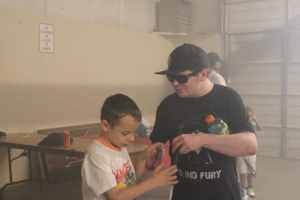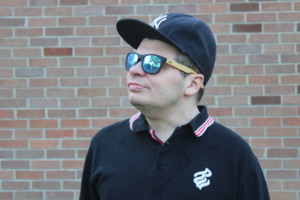Faces Behind the Screen: Blind Fury
Quick Links
<< Return to all “Faces Behind the Screen” stories
Stephen Norris, better known as Blind Fury, is a hip-hop recording artist and skilled MC battle rapper who originally hails from Camden, South Carolina. He rose to fame during his 2003 appearance on the live Rocafella MC battle on MTV.
Although Blind Fury has a spine defect called Spina-Bifida and is blind, he doesn’t let his lack of vision get in the way of his craft. Since starting in the rap game, Blind Fury has released several albums, including Gifted The E.P, Young and Gifted Always, and most recently, his new album, Ferda.
How and when did you start rapping?
BLIND FURY: I think how I really got started with rap was just listening to it, being around it, and realizing it was something that I probably shouldn’t have been a part of as a three-year-old boy from South Carolina. It was a lot of yelling, a lot of cursing, and a lot of 808 beats, and things I’d never heard before, so I thought that it sounded really cool. I liked it.
Back then, you didn’t want your three-year-old, four-year-old kid listening to 2 Live Crew and Snoop Dogg. Once I saw resistance from adults – people who weren’t necessarily against rap or hip-hop, I was like, “I can get in trouble for this and I like it.”
Which rappers or groups were the biggest inspiration for you growing up?
BLIND FURY: A lot of Bone Thugs-N-Harmony, a lot of Scarface, a lot of Busta Rhymes, a lot of Cypress Hill. I listened to a lot of West Coast hip-hop back then.
I tried to stay well-rounded and think I listened to more West Coast back then because G-funk was the thing, and it was very musical. West Coast music and southern music had a lot of guitars, a lot of 808s, and I was really fascinated by bass drops even back then. You know, Dr. Dre would incorporate all these different sounds from old school bands and samples, whereas East Coast rap was just all boom, boom, bap, ba-boom, boom, bap.
However, I typically liked to venture off into other music because I play piano a lot. Personally, I think that it’s really kind of boring trying to learn to play piano rap songs, so I eventually got into jazz, classic rock, country, and other genres as well.

A young visually impaired fan meeting Fury for the first time.
How did you originally start learning piano? Who got you into it and did you have a teacher?
BLIND FURY: I think it was the first Super Mario Brothers that influenced me to start playing piano. When I was younger, my cousins would be playing the game on their NES and when they got to the little castle stage, there would be this little jingle or sound bite that would play.
And that music, it just sounded so dope to me. Honestly, I’m lucky that I have an ear with near-perfect pitch. So I can hear things and immediately pick them up and play them. Once I figured out I could do that, I would just impress all of my friends and family by just playing Nintendo songs, which then turned into me learning real songs.
That’s amazing. Do you think that because you’re blind, your ability to hear or distinguish sounds is better than that of sighted people?
BLIND FURY: I don’t think it’s inherent like that. It’s not a natural thing as much as the learned behavior and adaptation of blind or low-vision people to their environments.
Take for example a person that is paralyzed from the waist down. They can’t use their legs, so as a result, they have to adapt using other parts of their body. As a result, you see paraplegics with bulky arms because they have to do everything with their arms.
So I think it really comes down to muscle memory. That strengthens, like with anything else. And I believe that if you can’t see, you’re automatically forced to use the other senses that you have. Because of that, since you rely on them more, it just makes them more dominant.
Growing up, what was your first memory of struggling to communicate with other people?
BLIND FURY: I don’t really remember having a struggle with communication with other people. I was fortunate in the sense that all of the people I went to elementary school with were also the same people that I graduated with. By the time they knew I was different, I had already been around for quite a while. I was introduced into a sighted world before sighted kids knew that I was blind, before I did.
Growing up, my mom wouldn’t allow me to use my lack of vision as a crutch. I remember one night, I told my mom when we were watching TV that I was thirsty and that I wanted something to drink.
She asked, “You got two feet right?”
I said, “Yeah.”
And she said, “I’ll tell you what. You go pour yourself something to drink. And if you make a mess, I’ll help you clean it up. But you’re going to try to do it.”
And that’s just how it was. My mom didn’t allow me to be all woe is me and be down on it.
That’s a great mindset to have. Looking back on it, what do you think of the way your mom raised you?
BLIND FURY: When I was younger, I was definitely resentful because I wanted to go to a blind school. I wanted to be around blind kids. But my mom didn’t want me to leave home for weeks at a time, and also wanted me to get used to the big old world outside of that blind school.
In other words, I think it’s really easy for a lot of people to just send their kids to blind schools and not necessarily deal with the problem. In the process, it really hinders their growth.
My mom took my training wheels off my bike when I was five. I got on it and didn’t realize that you’re supposed to lean and balance on it. I fell over and busted my head open. But see, it was an experience. I had to learn about the dangers of the world first-hand.
Faces Behind the Screen is a storytelling project focusing on members of the Deaf and hard of hearing community.



